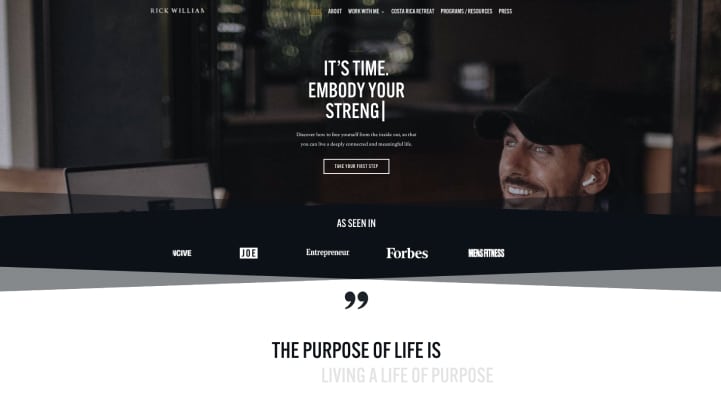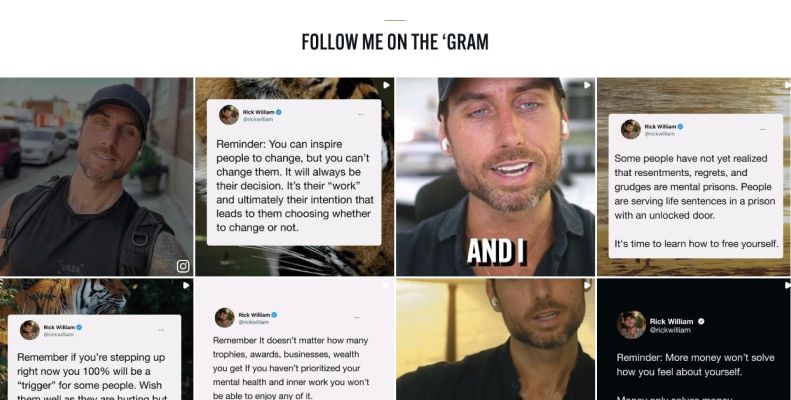In this comprehensive guide, we’ll explore the world of branding for coaches and provide you with valuable insights and tips to enhance your personal brand. From selecting your niche and defining your unique selling proposition to creating impactful brand visuals, leveraging testimonials, and finding your authentic voice, we’ve got you covered.
Are you a coach looking to stand out from the competition and attract more clients? In today’s crowded marketplace, branding
is the key to success. Building a strong personal brand sets you apart and gives people a compelling reason to choose your coaching services. It’s time to take your coaching business to the next level with effective branding strategies.
So, if you’re ready to boost your coaching business and increase your revenue, let’s dive into the world of branding for coaches together. Get ready to make a lasting impression and attract your ideal clients with a strong and compelling personal brand.
Key Takeaways:
- Branding is crucial for coaches to stand out in a crowded marketplace
- Good branding can increase revenue by up to 23%
- Selecting a niche and defining your unique selling proposition are key steps in building your coaching brand
- Investing in quality brand visuals and testimonials enhances professionalism and builds trust with clients
- Finding your authentic voice as a coach helps you connect with your target audience on a deeper level
Our portfolio reflects our deep expertise in branding, showcasing a range of successful projects tailored to coaches. With years of experience in the industry, we have honed an authoritative approach in design and strategy. Our consistent client satisfaction and positive testimonials underscore our trustworthiness, making Lovepixel a reliable choice for coaches seeking impactful and personalized branding solutions.
Why is branding important for coaches?
Good branding is essential for coaches to differentiate themselves in the market. It helps them attract their target clients, build trust, and grow their business. A consistent brand identity can increase revenue by up to 23% and 46% of consumers are willing to pay more for a brand they trust. Without branding, coaches risk blending in with the competition and not standing out.
A good brand helps you stand out from other coaches. Imagine someone looking online for a coach. They will see many names. A strong brand strategy helps you get noticed. It makes people want to click on your name and learn more. And if they like what they see, they will pick you.
The Importance of Branding for Coaches
- Branding distinguishes coaches from their competitors.
- A strong brand identity attracts the right clients.
- Building trust is crucial for long-term success.
- Increased revenue potential through effective branding.
- Consumers are willing to pay more for a trusted brand.
“Good branding is like a magnet, pulling in the clients who resonate with your unique coaching style and values.” – Jane Smith, Branding Expert
Coaches need to stand out in today’s competitive coaching industry. The right branding strategy sets them apart, helping them establish credibility, communicate their unique value, and connect with their ideal clients. With strong branding, coaches can create a lasting impression and build a trusting relationship with their audience.
Benefits of Branding for Coaches
| Benefits | Details |
|---|---|
| Increased Visibility | A well-defined brand attracts attention and sets coaches apart from the competition. |
| Client Attraction | Branding helps coaches attract their ideal clients who resonate with their message and values. |
| Trust Building | A strong brand builds trust and credibility, increasing client confidence and loyalty. |
| Revenue Growth | Effective branding can boost revenue by up to 23% through increased client conversions. |
By investing in branding, coaches can elevate their business and create a powerful presence in the coaching industry. It allows them to showcase their unique strengths, values, and expertise while appealing to their target audience. With the right branding strategy, coaches can confidently position themselves as industry leaders and attract the clients who align with their vision.
Example of great Branding for Coaches
I want to show you an example of great branding for coaches, straight out of our portfolio. Rick William is a Emotional Mastery Coach who came to us for a website and branding.

The brand identity is sophisticated and professional, showcasing a premium coaching service through a minimalist design and aspirational language. It’s personable, with a focus on the coach’s philosophy of living a purposeful life, reinforced by social proof to build credibility. The consistent visual and verbal branding is tailored to resonate with individuals seeking meaningful personal and professional growth.
The inclusion of personal elements, like Rick’s signature and photo, alongside impressive statistics and notable media endorsements, serves a dual purpose. It fosters a sense of intimacy and trust, while also underscoring the effectiveness and reach of his coaching services. This approach to branding is essential for coaches, as it bridges the gap between showcasing one’s expertise and building a relatable persona.
Consistency
The branding does not stop at the website. If you check out his Instagram account, of which we can see a preview on his website, you can see the branding is seamless and consistent. Branding for coaches is used for all digital and physical assets.

For coaches, such uniformity in branding is critical—it creates a recognizable and reliable identity that clients can trust. By harmonizing his message and design across various touchpoints, Rick reinforces his professional ethos and weaves a consistent narrative that clients can follow and connect with, whether they’re holding a business card, reading a post, or attending a webinar.
What is your coaching brand?
Defining your coaching brand is a crucial step in establishing yourself as a coach. It starts with selecting a niche that aligns with your expertise and passion. A niche helps you determine the direction of your brand and attract clients who specifically need your unique offering.
When defining your coaching brand, it’s important to have a clear idea of your target audience. Who are they? What are their pain points and aspirations? Understanding your audience allows you to tailor your message and create a brand that resonates with them.
“Selecting a niche is like choosing the road map for your coaching brand journey. It helps you focus your efforts and stand out in a crowded coaching market.” – Jane Smith, Founder of Lovepixel Agency
Your coaching brand should also reflect your unique strengths or value proposition. What sets you apart from other coaches? Maybe it’s your years of experience, a specialized skill set, or a unique coaching methodology. Identifying your unique strengths allows you to position yourself as an expert in your niche and attract clients who value what you have to offer.
Finding Your Niche
The first step in defining your coaching brand is finding your niche. Take some time to reflect on your interests, strengths, and experiences. What are you truly passionate about? Where do you excel? Finding a niche that aligns with your expertise and passion will make your coaching more enjoyable and attract clients who resonate with your unique offering.
- Reflect on your interests, strengths, and experiences
- Consider what topics or areas you are most passionate about
- Research the market and identify potential gaps or underserved segments
- Choose a niche that aligns with your expertise and passion
- Verify the demand for your niche by conducting market research
By defining your coaching brand and selecting a niche, you set the foundation for building a successful coaching business. It allows you to create a clear message that speaks directly to your ideal clients and differentiates you from the competition.
Your Unique Selling Proposition (USP)
In the crowded coaching industry, it’s important to find your unique selling proposition (USP) that sets you apart from others. Your USP is what grabs the attention of potential clients and differentiates you from the competition.
To discover your USP, consider what makes your coaching approach special. Do you have a unique methodology or technique that produces exceptional results? Are you targeting a specific audience and addressing their unique needs? Your USP could also be based on your own personal experience or expertise in a particular area.
Once you’ve identified your USP, it’s crucial to clearly communicate it to your target audience. Highlight it on your website, social media profiles, and marketing materials. Emphasize the benefits that clients will receive by choosing your coaching services.
Remember, your USP should be authentic and align with your coaching style and values. It should showcase what makes you different and reinforce why clients should choose you as their coach.
Your Brand Visuals
When it comes to branding for coaches, visuals play a crucial role in shaping how potential clients perceive your services. From your website to social media posts and overall design, investing in high-quality brand visuals is essential.
Quality branding enhances professionalism and credibility, making it more likely for clients to trust in your expertise and invest in your coaching services. On the other hand, poor branding can make you appear amateurish and deter potential clients from taking you seriously.
By incorporating visually appealing elements such as well-designed logos, color schemes, fonts, and imagery that align with your coaching style and target audience, you can create a captivating visual brand that sets you apart from your competitors.
“Your brand visuals serve as a visual representation of your coaching business, and they play a significant role in attracting and engaging potential clients. Investing in professional design and branding helps you create a positive first impression and sets the foundation for building trust and credibility.”
Remember, consistency in your visual branding across different platforms and touchpoints is key. This ensures that clients can recognize and connect with your brand at a glance, regardless of where they encounter it.
Your Testimonials
When it comes to building trust with potential clients, testimonials are a powerful tool for coaches. They provide social proof and demonstrate your ability to deliver results. Positive reviews from happy clients can instill confidence in others, pushing them towards making a decision to work with you.
“Working with [Client Name] has been a game-changer for me. Their coaching expertise and guidance helped me achieve my goals and unlock my full potential. I highly recommend their services!”
Well-placed testimonials can also serve as key elements of your personal brand. They showcase not only what you do but how well you do it. By featuring testimonials prominently on your website or in your marketing materials, you can build credibility and showcase the positive impact you’ve had on clients.
“I was skeptical about hiring a coach at first, but after reading the testimonials on [Coach Name]’s website, I knew I had found the right person to help me. Their testimonials reassured me that they were knowledgeable, trustworthy, and dedicated to helping clients succeed.”
Testimonials should be authentic and specific, highlighting the unique value you bring to your clients. They should focus on the outcomes, transformations, or experiences your clients have had as a result of working with you.
Examples of Effective Testimonials
- “[Client Name] helped me overcome my self-doubt and achieve what I once thought was impossible. Their personalized approach and insightful guidance made all the difference.”
- “Working with [Coach Name] was a transformative experience. They not only provided practical strategies for success but also supported me emotionally throughout the process.”
- “[Client Name] helped me gain clarity, set goals, and develop a roadmap to achieve them. Their expertise and encouragement kept me motivated and focused, resulting in significant progress in my personal and professional life.”
By showcasing these success stories from your clients, you can demonstrate the impact of your coaching and inspire potential clients to take action.
Your Voice
As a coach, finding your voice is essential for establishing a strong personal brand. It is through your voice that you communicate your unique perspective, values, and expertise to your target audience. By developing an authentic voice, you can connect with your clients on a deeper level and differentiate yourself from other coaches in the industry.
So, how do you find your voice as a coach? It takes practice and consistency. Writing regularly, whether it’s blog posts, social media content, or newsletters, helps you refine your voice and discover what resonates with your audience. It’s an iterative process, where you learn to express yourself in a way that feels genuine and relatable.
“Authentic communication is the key to building trust with your clients.”
Authentic communication is the key to building trust with your clients. When you speak from the heart and share your own experiences, struggles, and successes, you create a connection that goes beyond the coaching relationship. Clients appreciate coaches who are open, honest, and vulnerable.
Not only does finding your voice help you connect with clients, but it also sets you apart from other coaches. Your unique voice is what makes you stand out in a crowded market. Clients are drawn to coaches who have a distinct perspective and a passionate way of expressing themselves.
Remember, your voice is not just about what you say, but also how you say it. Consider your tone, language, and style of communication. Do you want to come across as friendly and approachable, or more serious and authoritative? Understanding your target audience and their preferences will help you tailor your voice to resonate with them.
BUILDING CREDIBILITY THROUGH CONTENT
Another effective way to build your brand is through content creation. Whether it’s blog posts, podcasts, or videos, content allows you to share your knowledge and establish credibility. It’s also an excellent opportunity to incorporate personal branding for coaches, as your unique perspective can add value to the content. Make sure the content is high-quality, relevant, and aligns with your brand message. This will attract more clients and position you as a thought leader in your industry.
For some inspiration about content, we’ve created a guide on how to introduce yourself online and have some ideas about content for coaches.
5 Strategies to Build Your Personal Coaching Brand
Building a strong personal coaching brand is essential for standing out in the competitive coaching industry. To help you establish a powerful brand presence and attract your ideal clients, here are five effective strategies:
- Differentiate Yourself: Set yourself apart from the competition by showcasing your unique qualities and strengths. Identify what makes you different as a coach and communicate it effectively to your target audience.
- Leverage Your Unique Qualities: Identify your unique qualities and strengths as a coach and leverage them to provide value to your clients. These qualities can include your background, experiences, and expertise that set you apart from other coaches.
- Express Your Values and Beliefs: Share your authentic values and beliefs with your audience. This helps you connect with like-minded individuals who resonate with your coaching approach and philosophy.
- Target a Specific Demographic: Define your target market and focus your branding efforts on a specific demographic. By speaking directly to their needs and desires, you can establish a deeper connection and increase the likelihood of attracting your ideal clients.
- Create a Compelling Coaching Package: Develop a unique coaching package that offers a clear, compelling, and results-driven value proposition. Clearly communicate the benefits and transformation your clients can expect to achieve through your coaching programs.
By implementing these five strategies, you can effectively build your personal coaching brand and position yourself as a standout coach in the industry.

Personal Branding for Coaches: Customizing to Fit Each Niche
Whether you’re an executive coach, a health and wellness mentor, or a life strategist, your personal brand is the key to connecting with clients and building a sustainable coaching practice.
Life Coaching Branding
For life coaches, personal branding is all about connection and relatability. Your brand should showcase your approachability, empathy, and the transformative impact you can have on an individual’s life. Personal branding for coaches in this niche often involves sharing personal stories and experiences to build trust and rapport with potential clients.
Executive Coaching Branding
Executive coaches need a personal brand that speaks to professionalism, leadership, and measurable success. Your branding should reflect a deep understanding of business dynamics and the ability to navigate the corporate world. Personal branding for coaches in the executive realm should underscore your experience with corporate clients and your success in driving tangible results.
Health and Wellness Coaching Branding
Personal branding for health and wellness coaches should focus on vitality, holistic well-being, and a balanced lifestyle. Your brand should communicate your passion for health and your commitment to helping clients achieve their wellness goals. Use imagery and language that resonates with rejuvenation and healthy living.
Career Coaching Branding
Career coaches should tailor their personal branding to emphasize career growth, professional development, and success. Your brand should appeal to professionals seeking advancement or career changes. Personal branding for coaches in this sector should highlight your expertise in career planning and your ability to help clients navigate their professional journeys.
Relationship Coaching Branding
For relationship coaches, personal branding should center on understanding, empathy, and the ability to resolve conflicts. Use warm, inviting tones in your branding, and focus on how you help clients build or mend relationships. Share success stories and insights that resonate with love, connection, and partnership.
Sports Coaching Branding
Personal branding for sports coaches should exude energy, motivation, and competitive spirit. Your brand should reflect your expertise in athletic training and your commitment to helping athletes achieve their peak performance. Use dynamic imagery and language that conveys movement, strength, and endurance.
Parenting Coaching Branding
Parenting coaches need a brand that communicates understanding, patience, and guidance. Your personal branding should resonate with parents looking for support and strategies in raising their children. Emphasize your experience in dealing with family dynamics and child development.
Financial Coaching Branding
For financial coaches, personal branding should evoke trust, expertise, and financial savvy. Your brand should appeal to clients looking for guidance in managing their finances, investments, or preparing for retirement. Highlight your knowledge in financial planning and your ability to help clients achieve financial stability.
Spiritual Coaching Branding
Spiritual coaches should develop a personal brand that reflects inner peace, enlightenment, and personal growth. Use imagery and language that speaks to the soul, inner peace, and self-discovery. Share how your coaching helps clients on their spiritual journey.
Business Coaching Branding
Business coaches require a brand that underscores strategic thinking, business acumen, and growth. Your personal branding should appeal to entrepreneurs and business owners looking for guidance in growing their businesses. Highlight your experience in business development and your ability to drive business success.
FAQ
What is branding for coaches?
Branding for coaches involves creating a distinct image and reputation that sets you apart in the coaching industry. It helps you attract clients who resonate with your values, style, and expertise.
Why is branding crucial for coaches?
Branding is vital because it establishes trust and credibility. In a profession where personal connection is essential, a strong brand helps potential clients understand what you offer and why they should choose you.
How can I create a unique identity in branding for coaches?
To establish a unique identity, focus on your core values, mission, and what differentiates you from other coaches. These elements serve as the foundation of your brand and guide all other branding decisions.
What role does consistency play in branding for coaches?
Consistency is key in branding for coaches as it helps people recognize and trust you. Whether it’s the tone of your content or the visual elements on your website, consistency across all platforms enhances your brand’s reliability.
How can client testimonials enhance branding for coaches?
Testimonials serve as social proof and add credibility to your brand. Positive reviews from satisfied clients can significantly influence potential clients, making them more likely to choose you as their coach.
